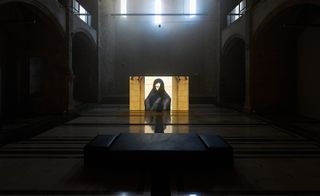The story of Carmen is famously marked by dying. Written in 1875 by composer Georges Bizet, the opera’s title character is offered as each a robust power and a hard seducer. In its conventional telling, Don José is haplessly led astray by Carmen; her homicide at his arms framed as the results of her personal actions. It has been reinterpreted many instances through the years, most lately, by artist and filmmaker Wu Tsang, whose expertise as director at Zurich’s Schauspielhaus brings a wealthy perception into reside efficiency.
Tsang has been researching the story for the final eight years, culminating in an opera-theatre hybrid present with interdisciplinary artist group Moved by the Movement, and a movie set up that has lately premiered at MACBA in Barcelona (till 3 November 2024). The movie set up ‘La gran mentira de la muerte’ takes dying as its central theme, exploring the a number of methods by which this threads by Carmen’s story. Within the creation of those works, Tsang has studied each flamenco and basic interpretations of the opera and needed to construct a bridge between them as somebody straddling a number of artwork varieties.
View of ‘La gran mentira de la muerte’ (The massive lie of dying) at MACBA
(Picture credit score: Photograph: Miquel Coll, 2024)
Wu Tsang is especially within the parallels between flamenco and bullfighting, which in numerous methods exude dying as efficiency
‘Carmen has at all times drawn me in,’ she tells me. ‘There are all these completely different associations we’ve within the popular culture creativeness about Carmen. For over a century we’ve been repeatedly drawn to her character. Many various individuals have claimed this character: she’s feminist, or she’s an emblem of freedom. She’s additionally a conduit for all types of misogyny as a result of within the story she’s at all times sacrificed. She has to die due to what she represents, due to her freedom.’
For ‘La gran mentira de la muerte’, Tsang has invited collaborative performers to reinterpret the story: flamenco dancers Rocío Molina, José ‘El Oruco’ and Yinka Esi Graves; efficiency artist and dancer Tosh Basco; and bullfighter Vanessa Montoya. She is especially within the parallels between flamenco and bullfighting, which in numerous methods exude dying as efficiency.

View of ‘La gran mentira de la muerte’ (The massive lie of dying) at MACBA
(Picture credit score: Photograph: Miquel Coll, 2024)
‘There are various deaths in Carmen. The obvious being her personal. I used to be additionally eager about filmmaking and the seize of efficiency as a type of dying,’ says Tsang. ‘As a video artist, I’ve been centered on efficiency filmmaking for quite a few years, and I like to consider methods by which the movie can interpret the expertise of the efficiency. Flamenco is one thing that in its essence challenges the thought of being captured. It’s a really reside artwork kind.’
For the movie’s multi-channel, spatialised sound, Tsang regarded to the stress and suspense created by music in horror films. Music has additionally been an essential consider retelling the story for the stage, with composers Andrew Yee and Asma Maroof’s new theme for Don José reflecting his jealousy as a driving issue inside the authentic plot. This reasserts his autonomy and violence inside the story, quite than focusing upon Carmen because the disrupting power that has in some way corrupted him. Tsang notes how even Carmen’s theme, performed when she enters the stage, serves to spotlight her as harmful.
‘She represents a type of non-Europeanness, as a gypsy who participates in an alternate way of life,’ says Tsang. ‘What does it imply within the Western, European sense for somebody like her to be each the hero and be sacrificed? What’s our obsession with needing to kill an individual like her?’
‘La gran mentira de la muerte’ (The massive lie of dying) is at MACBA in Barcelona till 3 November 2024
macba.cat
Supply: Wallpaper

